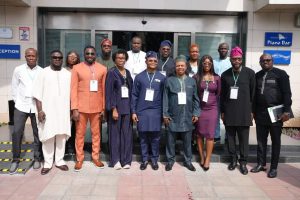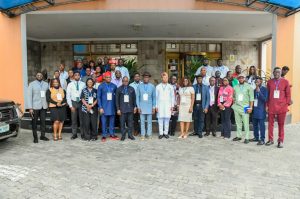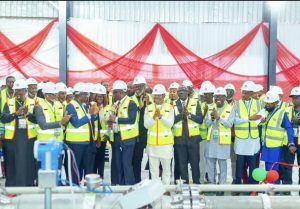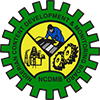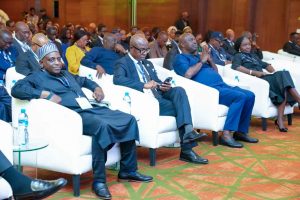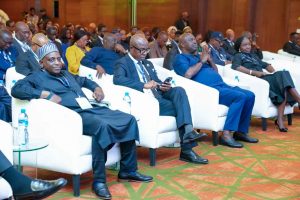The Nigerian Content implementation framework has continued to firmly pitch Nigeria as an evolving energy market and a continental economic power block as African countries are imbibing the local content philosophy into their national economic agenda. The latest being the Republic of Congo, recently held a regional conference on the promotion and development of its national private sector in Brazzaville.
In a presentation on the Nigerian Content model, the Executive Secretary, Engr. Ernest Nwapa appraised Nigeria as one of the countries best projecting the benefits of Local Content and dropped the hint that the Board’s invitation to the conference was a validation of President Goodluck Ebele Jonathan’s commitment to African collaboration as Nigeria has been on the forefront of this integration.
The presentation which gave an overview of the Nigerian economy with special focus on the oil and gas industry had Engr. Nwapa enumerate provisions of the NOGICD Act 2010 giving a philosophical basis of what the law tried to achieve over the past few years.
The Executive Secretary explained that Nigerian Content has brought about in-country value addition where activities of the industry are geared towards actually creating value, employment and getting the nationals to participate in the oil and gas value chain to promote the development and use of local resources which is a shift from the previous revenue focused option that promoted getting goods off-the-shelf and the importation of goods and services.
According to him, “every project being run in Nigeria must leave a big legacy, either a fabrication yard, an integration yard or an asset that will continue to run even after the project is completed ” These, he informed, are very practical steps which foreign partners understand to be important and not an imposition of anything unusual on the foreign partners. The Executive Secretary revealed plans to go into Industrial Park Schemes so that SMEs will partner with OEMs from foreign countries who do not necessarily want to set up their own factories in Nigeria but are willing to support the development of the SMEs.
Justifying the Nigerian Content policy, Engr. Nwapa said, “the participation of Nigerians in the industry has grown to a good extent which today, engineering in the oil and gas industry is done 90% in-country, fabrication of all the field development facilities now has 50% of the tonnage done in Nigeria but the major issue is in manufacturing which is where the knowledge and technology is”.
He called on African nations to take the issues of funding and R&D for technological advancement seriously in order to create shop floors where people can work and learn through manufacturing. The Board’s helmsman further enumerated the thrust of the Local Content Act to include maximizing the utilization of Nigerian made goods and services, human resources development and to get Nigerians to own assets.
He also mentioned the initiative to link the oil and gas industry to other sectors of the economy such as agro, telecoms, automotive and manufacturing sectors for the purpose of diversifying the economy with a focus on job creation. The Nigerian Content chieftain concluded by saying, “Africa can create capacity by learning from each other to see how we can standardize our development strategies”, adding, “it is a continent that can collaborate and still work with the larger international community with synergy”.
Speaking earlier at the plenary, the President of the Republic of Congo, Mr. Denis Sassou Nguesso who spoke through one of his ministers, highlighted the theme of the conference to the country’s march towards economic emergence in 2025 in which the national private sector must be effective as the basic unit in the economic development process.
The Congolese President opined that experience in other countries, particularly in Africa informed the decision to promote private sector with an aim to implement the general rule of local content for all projects developed by investors and foreign partners, supply of certain goods and services in oil and gas reserved for Congolese nationals and the reservation of participating interest in oil fields to indigenous operators which is why he mandated government departments particularly mining, oil & gas, and commerce & industry to propose measures necessary to create a conducive environment for the promotion and development of private enterprises in Congo’s key economic sectors of mining and oil & gas.
The objective was handed down the National Steering Committee to put in place under the authority of the President of the Republic, legislative and regulatory framework to be adopted for the implementation of the principles it sets out to achieve. The Steering Committee is, however, responsible for ensuring the procedures are in place and to propose desirable evolution in the overall interest of the Congolese people.
Mr. Nguesso asserted that he attached great importance to the proper implementation of the directive with a responsibility on his office to monitor and control the implementation with a weekly report to be made by his cabinet. The Congolese leader affirmed his belief that the development and stability of any country must be based, to a greater extent, on a solid national pedestal.
The event which was held at the conference hall of the Congolese Foreign Affairs Ministry in Brazzaville had in attendance officials from Ghana and Rwanda who also made presentations on case studies of their economic strategies to bolster indigenization, entrepreneurial development, privatization and foreign direct investment.
Discover more from Nigerian Content Development & Monitoring Board
Subscribe to get the latest posts sent to your email.

